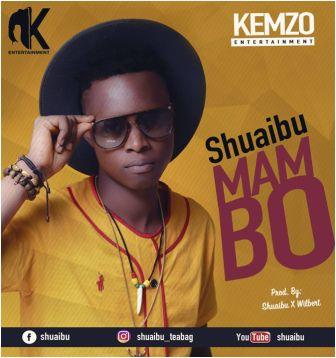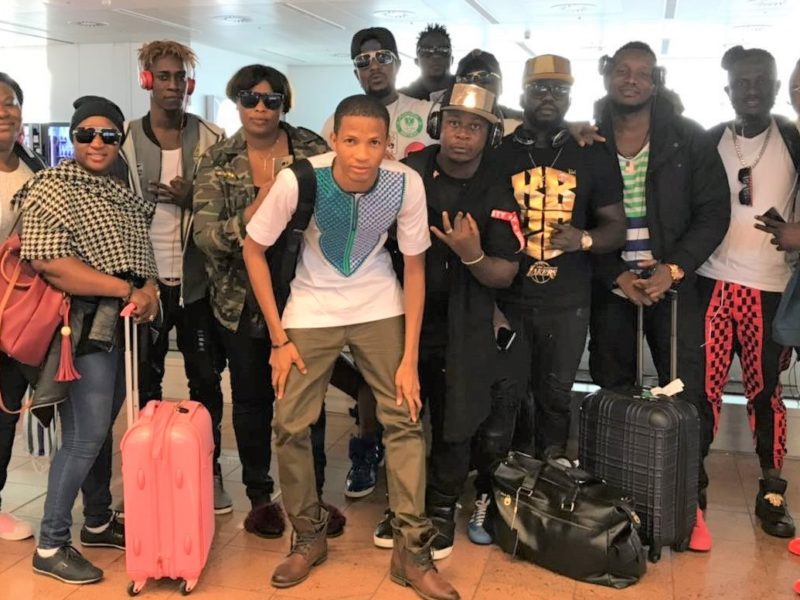Violence in the Sierra Leone Music Industry… How it started
Can We Blame The Youth? – At a time when many Sierra Leoneans at home and abroad are busy with final preparations for the holidays, the country is held hostage by gang violence linked to the emerging music industry. Rivalry between artists mainly coming from the US has escalated to a new level, and rallies once held to promote artists’ album releases are now avenues for street violence. It is so disturbing that the government issued a press release banning all rallies and most recently, holding a meeting with rival artists and giving a stern warning against any further disruptions of public peace and quiet. All responsibilities have been placed upon the musicians and their unruly fans. However, are there underlying reasons that are not mentioned? Let’s find out. (Photo: Kao Denero)
The war in Sierra Leone left the country with many problems, but for convenience sake, we will stick with one, and that is – disgruntled youth.
Many young people grew up during the war and experienced a lot of trauma. Many of them saw harm inflicted on them or their relatives, and some of them were child soldiers forced to inflict harm on others. Most of the youth involved in gang activity in the nation today are below the age of 30, meaning, the majority were just in their teens when the war ended – and considering the fact that the war took at least ten years, they were all between the ages of 3 to 10 years old when the war started. This is one scenario.
Secondly, following the war, the SLPP government was more focused in restructuring the armed forces, police, and restoring public peace. Programs geared towards youth empowerment were either not followed through or non-existent, mainly due to corrupt politicians failing to do their home work. Therefore, young people were either left to care for themselves or depend on relatives for survival. Instead of looking forward to the government for incentives on life and progress, many young men turned to the streets, which they saw as more caring to their problems, and more convenient for their situation at hand.
Jimmy B, commonly known as the “godfather” of Salone music, saw this loophole, and decided not to cross his hands and wait for government assistance. He recognised some talented youth and decided to use his resources to help them realise their goal. He succeeded in many ways and most of the artists he helped are currently big names in the Salone Music Industry. This push, together with his own music, helped launch the industry as we know it today. Other than Jimmy B, there was the underground hip-hop music that had been in existence during the war, where rap battles were organised among different groups of artists to determine who is the best when it comes to composing the best rhymes. These hip-hop artists, with influence of American hip-hop stars like Tupac, Biggie, Nas, Snoop Dogg, etc, had a more independent mentality. One of them, who was a winner of many of these battles, formerly known as Snoop Kao, is now popularly known as Kao Denero. Others are Baw Waw Society, Pupa Bajah, Y.O.K, etc.
Kao Denero recorded his first album in Guinea, around 2009 but never released it due to the absence of real backing to promote his material. He later got the opportunity to travel to the U.S as many Sierra Leoneans during the war. On arrival in the land of Uncle Sam, Kao re-recorded a new album within a year, and since he did not have the means to travel home to release it, he sent it to Sierra Leone for release. The album was titled “Black Leo 4 Life” and was an instant hit among young people nationwide, who saw him as an example that their kind can actually succeed in fulfilling their goal, if he/she persists. The next year he released “Stories From Freetown” and the following year “King of Freetown”.
Duirng this time, other artists who were equally involved in the underground music scene had emerged as serious competitors to Kao and his crew. These are Pupa Baja and the Baw Waw Society. They immediately tried to put a stop to Kao’s claim of being the “King Of Freetown”. They released their own materials, and this was the first serious competition among recording artists. The thug of war initially started as “lyrical warfare”, and soon took a different turn. Kao Denero and Baja emerged as the real competitors, with Kao sticking to strict hip-hop music, whilst Baja would do hip-hop, dancehall and some traditional music commonly called “gbingbiski”. The latter became more acceptable because many fans thought that hip-hop lack the support to move forward in Salone. However, Kao persistently continued with hip-hop music and collaborated with a young Sierra Leonean enterpreneur, C.E.O of Afrikan Flava Productions, to release a new album called “Freetown’s Most Wanted” in 2006.This was the defining moment of hip-hop music in Sierra Leone.
In 2008, Kao Denero further collaborated with this same label (Arfrikan Flava), to release his most critically acclaimed album to date, titled “The New Beginning”, meaning a new page and chapter in the Salone music business. At this time Bajah and the Dry Eye Crew had moved to the U.S and signed a deal for an International album, leaving the field open for Kao in Freetown, with no serious competition. In this same year, another crew led by Y.O.K challenged Kao again, but they were short lived, as they were quickly dominated by the Black Leo crew. Then in late 2009,another lesser known artist hailing from the U.S came to the scene with a chart topping song called: “Money Na Bank”. This artist was LAJ, meaning, Life After Justice.
At first it was all love among artists and this song was remixed to feature all the top artists in the Salone hip-hop music scene living in the U.S, including Kao Denero. Somehow, some way, problems started to emerge between the “Red Flag Movement” of LAJ and Kao Denero’s Black Leo, to an extent where fights took place among fans and beef songs released. The climax of this conflict was witnessed by thousands of fans at the National Stadium during the independence celebrations of 2010 when AKON was invited, when both artists were seen openly pulling each other for the mic on stage which finally ended in the hands of Kao Denero.
As we all know, December is the month of many activities for artists in the country and this one is no different. Kao Denero decidedly did not go home this December and most of the drama we are hearing or witnessing is between LAJ and one of his former crew members in Maryland called Menace the General. It is very important to note that during the many years of conflict between artists in Salone, it never reached the level of gangs until now. During Kao and Baja’s (the biggest rivalry ever) struggles, we did not see any colors displayed as representing one crew or the other. It was physical sometimes but never gang related. Infact, during Kao Denero’s album release of “Freetown’s Most Wanted”, Baja and his crew were guest performers. We have also seen rivalries between Emmerson and Innocent, but no fights.
To conclude, hip-hop music in Sierra Leone has been both good and bad. Good because it has been instrumental in igniting a sense of entrepreneurship in many youth. Most of the artists today are employing at least 20 to 30 youths to run their affairs. Kao Denero’s Black Leo have an Executive body responsible for promotion and distribution of all Black Leo products and negotiating contracts with show promoters. Most of them, if not for this venture, would be in the streets somewhere smoking weed all day or doing other drugs. The same goes for LAJ, Pupa Baja and many other artists. They all have serious influence in young people across all regional or tribal boundaries, and if they are assisted properly, can make an enormous difference. The bad influence of hip-hop is that some of the methods used seem to be imported and the real Sierra Leonean values are not prevalent. Some of the material in these songs are definitely below standard. Although, as can be noted in many songs by Kao and Baja, there is a high level of National pride in many of their songs.
My advice: Instead of threatening to ban shows and rallies, find a way to help these artists move to the next level. Other than inviting artists like Akon and paying them hundreds of thousands of dollars, stick to these local artists and pay them that money. Show them they have value and promote them internationally. Government spends millions on Leone Stars and they keep loosing matches. Why not focus on musical talents that surely have the capacity to make Salone proud. Artists like Emmerson, Kao, K-Man and others can do better with government support. And for the youths running around with gang violence, government has the obligation to create jobs and take them off the streets and not just rein in and blame them when there is a problem. Politicians use these same young people during elections to cause havoc, what do you think you will get back?
Please “Don’t Blame The Youth”!
By Algassimu Monoma Bah.
Stay with Sierra Express Media, for tour trusted place in news!
© 2010, https:. All rights reserved.







James
/
Thanks for this well-written stuff. It really brings to life what we have been advocating for sometime now about support for youth development and employment in Sierra Leone. Sierra Leonean gang culture is spreading fast to as far as Canada and UK. Recently, two notorious and violent local gangsters of Sierra Leonean origin were deported from these countries.
The fear now is that such gangsters are going to be used by politicians at election times to inflict violence on their communities.
Thanks.
James Fallah-Williams
30th March 2011Sierra Leonean Human Rights Activist